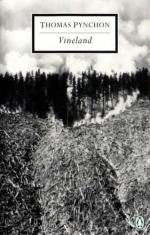|
This section contains 5,884 words (approx. 20 pages at 300 words per page) |

|
SOURCE: "Love and Death in and Around Vineland, U.S.A.," in Boundary 2, Vol. 18, No. 2, Summer, 1991, pp. 166-80.
In the following essay, Wilde examines the major themes, narrative presentation, and parody in Vineland. Citing the problem of indeterminacy and equivocation in the novel, Wilde contends that "Vineland seems from time to time to become what it beholds; a busy, pop version of America more attentive to momentary surfaces than to depth."
Presided over by "the hacker we call God," populated by characters who are "beneath [His] notice," who are in fact only so many "digits in God's computer," Vineland returns Pynchon's readers to threatening but familiar ground. We are back, it seems, in the world of Oedipa Maas, with its "zeroes and ones twinned above, hanging like balanced mobiles right and left, ahead, thick, maybe endless." Actually, all of Pynchon's novels stipulate opposition as their basic formal principle...
|
This section contains 5,884 words (approx. 20 pages at 300 words per page) |

|


